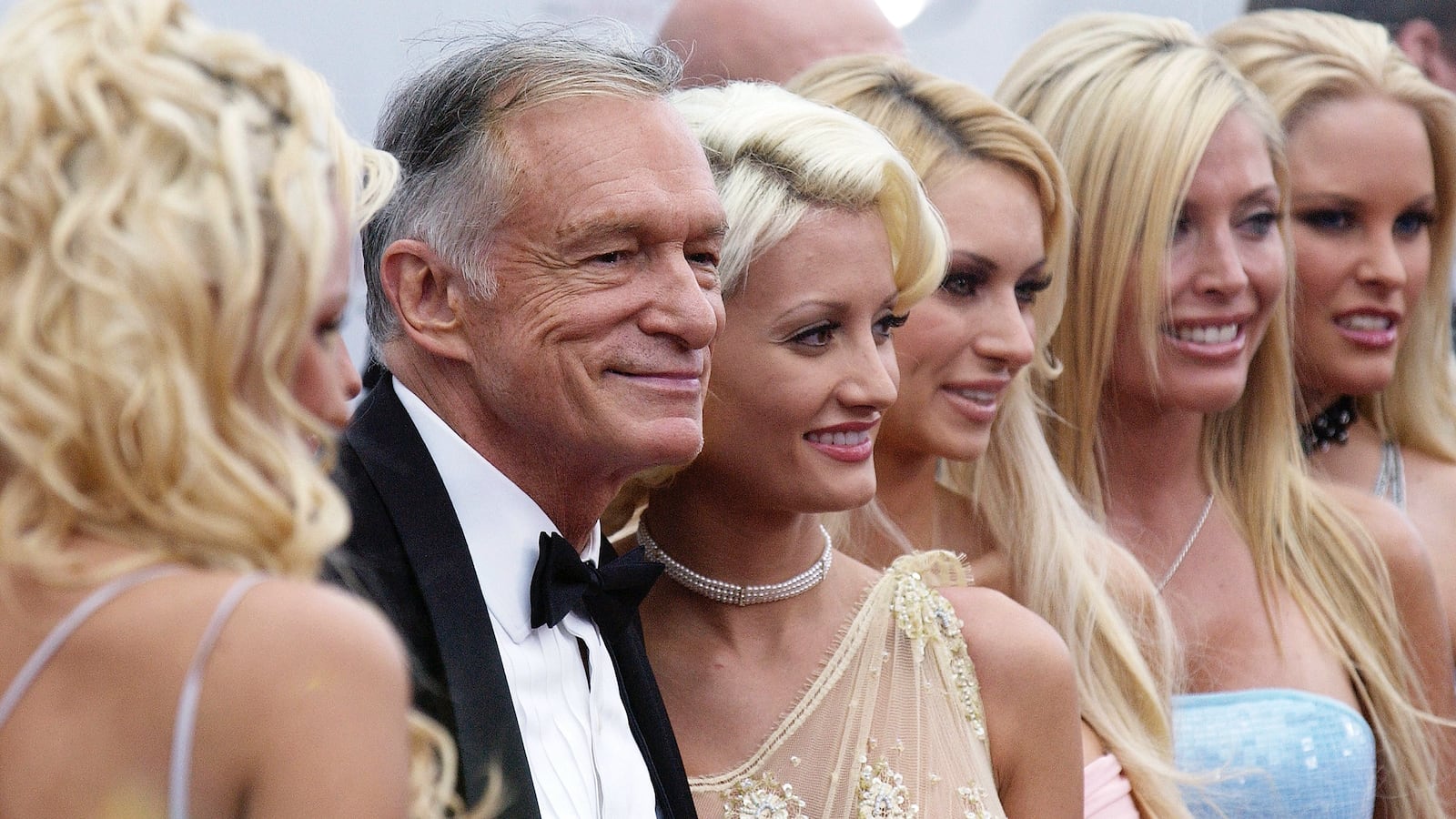Hugh Hefner founded his Playboy empire on a supposed ethos of pro-female sexual freedom and liberation, but Secrets of Playboy paints a far uglier picture of the culture he created, and the behavior he encouraged—and participated in—during his reign. A&E’s 10-part docuseries is a no-holds-barred censure of the pipe-smoking, silk pajama-wearing mogul, casting him as a predator who personally raped, coerced, and dominated Playmates, allowed his friends and celebrities (among them Bill Cosby) to do likewise, and fashioned a cult-like environment to satisfy his incessant appetite for sex and power. Damning evidence and accusations abound in this exposé, made all the more believable by talking heads who say they experienced Hefner’s abuse first-hand, as well as by the show’s own confident willingness to, at times, include pro-Hefner voices that push back against criticisms of his conduct.
Secrets of Playboy (Jan. 24) is a sprawling affair driven by commentary from many of those who suffered at the hands of Hefner and Playboy, led by his former Playmate girlfriend Sondra Theodore, once-Director of Playmate Promotions Miki Garcia, and long-time “Bunny Mother” PJ Masten (who oversaw female staffers at the Playboy nightclubs). Along with numerous other Playmates, Playboy Mansion employees, cultural critics and journalists, they reveal a Hefner far more sinister and deviant than the cool, open-minded, swinger-ish persona he presented to the public. To them, Hefner was a “monster” who used drugs both for his own pleasure and to victimize women; forced himself on anyone he coveted and pimped out whoever he pleased to his male acquaintances; and fed upon the young and innocent like a “vampire” until their bright light had been fully extinguished.
Moreover, the series claims he was apparently a pervert with a taste for snuff films and bestiality.
According to Secrets of Playboy, Hefner wasn’t just a kid in a candy shop; he was the creator, owner, and chief resident of the entire factory, and he behaved as an entitled king who saw the innumerable wannabe-centerfolds who entered his domain as his property. As Theodore remarks, this led to all manner of disgusting and criminal behavior, from miserable mass orgies to outright sexual assault—something also alleged by Playmate Susie Krabacher, and about his trysts with murdered 1980 Playmate of the Year Dorothy Stratten. Theodore, who dated Hefner from 1976-1981, believes that as time wore on, Hefner’s carnal appetites grew more extreme and transgressive (i.e. he needed crazier kinks to get himself excited), culminating in his admitted interest in snuff films and sex with dogs (via an allegedly notorious Mansion episode involving Deep Throat star Linda Lovelace and a German Shepherd). In Theodore’s mind, the thrill Hefner received from such domination and violence was directly related to the control he exerted over Playmates, which he allegedly achieved by isolating them at the mansion, dictating every aspect of their appearance and behavior, and videotaping them through secret cameras strewn throughout his property.
Where to Stream Secrets of Playboy: on the A&E channel via Hulu+ Live TV, Sling TV, or Philo (sign up for a free 7-day trial here).
Theodore says that Hefner’s oppressive impulses and desires are why he was fascinated by Charles Manson; the tycoon reportedly owned pre-murder tapes made at the Spahn Ranch. Secrets of Playboy is rife with such anecdotes, including about the celebrities that loved to frequent the Playboy Mansion during its heyday. To the surprise of no one, Bill Cosby features heavily in that conversation, in no small part due to Masten’s claim that she was raped by the comedian during her Playboy tenure. As with virtually every other crime alleged in the series, Masten’s ordeal was blown off by Playboy bigwigs, swept under the rug in order to protect Hefner’s—and the company’s—squeaky-clean image as a purveyor of “artistic,” “girl next door” female sexuality divorced from the smut of rivals Penthouse and Hustler. That Playboy had literal “clean-up crews” on call to make unpleasant incidents (overdoses, deaths, rapes, etc.) disappear is, in this context, a far from surprising revelation.
Secrets of Playboy is awash in archival material, and on occasion it shrewdly uses Hefner soundbites—in juxtaposition with Playmates’ current denunciations—to underscore his hypocrisy and lies. The overarching contention here is that Hefner sold Playboy as a bastion of wholesome tolerance and enfranchisement while he, in truth, fashioned a hedonistic hell that devoured its lured-to-their-doom prey. Theodore, Garcia, Masten and their traumatized and furious compatriots make for strong, empathetic witnesses in this case, and their trustworthiness is amplified by the similarities of their anguished experiences. That said, not everyone comes off perfectly; Holly Madison, one of Hefner’s early-2000s girlfriends (and the co-star of E!’s The Girls Next Door), strains to portray herself as simply a victim who fell under Hefner’s spell, especially in light of others’ counterbalancing statements about her ambitions.
Much of what’s recounted in Secrets of Playboy has been heard before, but the series benefits from its collection of we-were-there speakers, even if they’re not all equally convincing. Hefner is castigated as a tyrant who coerced and exploited young women for his professional gain and personal pleasure, and inspired others to do likewise. Of those accomplices, few were as horrific as his long-time physician and confidant Dr. Mark Saginor, whose daughter Jennifer grew up at the Mansion with her father and divulges all sorts of sordid secrets about the copycat mini-mansions that Mark and others maintained (as places to allegedly groom and mistreat aspiring starlets), the substance abuse that was an incessant facet of this lifestyle, and—most surprising of all—the fact that she firmly believes Hefner and her dad weren’t just best friends… they were lovers.
Separating truth from fiction can sometimes be difficult in Secrets of Playboy, which freely blends concrete proof and conjecture. On the whole, though, the docuseries unearths an overwhelming amount of rottenness. In doing so, it dismantles the legacy of Hefner as a pioneer of a new, more modern and open sexual frontier, and of Playboy as a beacon of feminine self-expression and empowerment. The feminists who are seen slamming Hefner on The Dick Cavett Show may have seemed—to Hefner, and to the American culture at large—like “radical” killjoys in 1970, but as A&E’s #MeToo-era investigation makes clear, they were simply ahead of their time.
The Daily Beast has affiliate partnerships. These do not influence editorial content, though we may earn commissions for products purchased via affiliate links.







